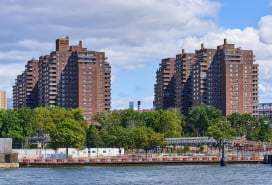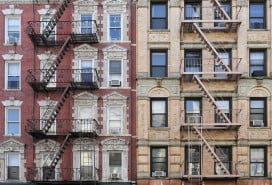Q. Last year, I rented an apartment in NYC for the first time, and now I'm having some issues with the renewal. My lease ends on Aug 31, 2013. Currently, I'm paying $2,400/mo, and the renewal asks for $2,700/mo for next year.
In my lease that I signed last year, there is a term that says:
"The parties hereto agree that pursuant to the Rent Regulation Reform Act the subject apartment is de-stabilized and exempt from any rent regulatory control in that the prior lawful rent is $2,500.00 or greater."
We also received an Annual Apartment Registration 2013 form that says that the apartment became permanently exempt since 8/10/2012 (which is when I moved in), and it says that it's a High Rent Vacancy, and that the last legal regulated rent is $2,269.06.
Clearly, I didn't read my lease carefully, nor did I understand it fully at the time when I signed it. Since what I'm paying currently is not $2,500.00 or greater, am I still protected by rent stabilization? If so, what can I do about the lease renewal? If not, can you help me understand what that term in my lease means?
A. Based on the facts that you have provided, your apartment is no longer part of the Rent Stabilization program and your landlord is free to ask for any amount of rent that he or she desires.
There are two ways that stabilized apartments can become “destabilized.”
The first occurs when the legal regulated rent reaches $2,500 or more and the current tenant earns $200,000 in income two years in a row. The second occurs when the legal regulated rent reaches $2,500 or more and the apartment becomes vacant. The latter situation applies to your circumstances.
According to the Annual Apartment Registration that you received, the last legal regulated rent before you signed your lease was $2,269.06. Pursuant to the Rent Regulation Reform Act, landlords are entitled to a vacancy allowance when a stabilized apartment becomes vacant. Basically, it allows them to increase the rent by a certain percentage of the prior rent. In your case, the increase raised the legal rent above the $2,500 price point which in turn deregulated the apartment. At that point, the apartment became “market rate” and the landlord was permitted to charge whatever the market would bear, which in your case, was $2,400.
Landlords that are parties to market rate leases may increase the rent in a renewal lease by any amount that they wish absent a provision in the lease agreement to the contrary. Therefore, at this point, your best bet is to negotiate with your landlord and attempt to agree on a rent somewhere between $2,400 and $2,700. Perhaps your landlord would agree to enter into a two-year lease with you with the rent rising to $2,700 next year if you agree to pay $2,550 this year.
Mike Akerly is a New York City real estate attorney, landlord, and real estate broker. He is also the publisher of the Greenwich Village blog VillageConfidential.
Note: The information provided here is for informational purposes only. It should not be construed as legal advice and cannot substitute for the advice of a licensed professional applying their specialized knowledge to the particular circumstances of your case.
See all Rent Coach.
Related:
Renting advice from the master
Ask an Expert: Can I overstay my lease?
Renter's Survival Kit


























